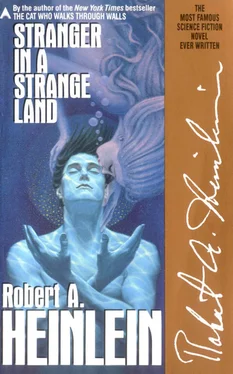Robert Heinlein - Stranger in a Strange Land
Здесь есть возможность читать онлайн «Robert Heinlein - Stranger in a Strange Land» весь текст электронной книги совершенно бесплатно (целиком полную версию без сокращений). В некоторых случаях можно слушать аудио, скачать через торрент в формате fb2 и присутствует краткое содержание. Жанр: Фантастика и фэнтези, на английском языке. Описание произведения, (предисловие) а так же отзывы посетителей доступны на портале библиотеки ЛибКат.
- Название:Stranger in a Strange Land
- Автор:
- Жанр:
- Год:неизвестен
- ISBN:нет данных
- Рейтинг книги:3 / 5. Голосов: 1
-
Избранное:Добавить в избранное
- Отзывы:
-
Ваша оценка:
- 60
- 1
- 2
- 3
- 4
- 5
Stranger in a Strange Land: краткое содержание, описание и аннотация
Предлагаем к чтению аннотацию, описание, краткое содержание или предисловие (зависит от того, что написал сам автор книги «Stranger in a Strange Land»). Если вы не нашли необходимую информацию о книге — напишите в комментариях, мы постараемся отыскать её.
Stranger in a Strange Land — читать онлайн бесплатно полную книгу (весь текст) целиком
Ниже представлен текст книги, разбитый по страницам. Система сохранения места последней прочитанной страницы, позволяет с удобством читать онлайн бесплатно книгу «Stranger in a Strange Land», без необходимости каждый раз заново искать на чём Вы остановились. Поставьте закладку, и сможете в любой момент перейти на страницу, на которой закончили чтение.
Интервал:
Закладка:
“Um. I’ll think about it.”
“But if you do, Duke, don’t fake it. If Mike accepts your offer of water-brotherhood, he’ll be dead serious about it. He’ll trust you utterly, no matter what—so don’t do it unless you are equally willing to trust him and stand by him, no matter how rough things get. Either all out—or don’t do it.”
“I understood that. That’s why I said, ‘I’ll think about it.’”
“Okay. But don’t take too long making up your mind… because I expect things to get very rough before long.”
XIV
IN THE VOLANT LAND OF LAPUTA, according to the journal of Lemuel Gulliver recounting his Travels into Several Remote Nations of the World, no person of importance ever listened or spoke without the help of a servant, known as a “climenole” in Laputian—or “flapper” in rough English translation, as such a Servant’s only duty was to flap the mouth and ears of his master with a dried bladder whenever, in the opinion of the servant, it was desirable for his master to speak or listen.
Without the consent of his flapper it was impossible to gain the attention of any Laputian of the master class.
Gulliver’s journal is usually regarded by Terrans as a pack of lies composed by a sour churchman. As may be, there can be no doubt that, at this time, the “flapper” system was widely used on the planet Earth and had been extended, refined, and multiplied until a Laputian would not have recognized it other than in spirit.
In an earlier, simpler day one prime duty of any Terran sovereign was to make himself publicly available on frequent occasions so that even the lowliest might come before him without any intermediary of any sort and demand judgment. Traces of this aspect of primitive sovereignty persisted on Earth long after kings became scarce and impotent. It continued to be the right of an Englishman to “Cry Harold!” although few knew it and none did it. Successful city political bosses held open court all through the twentieth century, leaving wide their office doors and listening to any gandy dancer or bindlestiff who came in.
The principle itself was never abolished, being embalmed in Articles I & IX of the Amendments to the Constitution of the United States of America—and therefore nominal law for many humans—even though the basic document had been almost superseded in actual practice by the Articles of World Federation.
But at the time the Federation Ship Champion returned to Terra from Mars, the “flapper system” had been expanding for more than a century and had reached a stage of great intricacy, with many persons employed solely in carrying out its rituals. The importance of a public personage could be estimated by the number of layers of flappers cutting him off from ready congress with the plebian mob. They were not called “flappers,” but were known as executive assistants, private secretaries, secretaries to private secretaries, press secretaries, receptionists, appointment clerks, et cetera. In fact the titles could be anything—or (with some of the most puissant) no title at all, but they could all be identified as “flappers” by function: each one held arbitrary and concatenative veto over any attempted communication from the outside world to the Great Man who was the nominal superior of the flapper.
This web of intermediary officials surrounding every V.I.P. naturally caused to grow up a class of unofficials whose function it was to flap the ear of the Great Man without permission from the official flappers, doing so (usually) on social or pseudo-social occasions or (with the most successful) via back-door privileged access or unlisted telephone number. These unofficials usually had no formal titles but were called a variety of names: “golfing companion,” “kitchen cabinet,” “lobbyist,” “elder statesman,” “five-percenter,” and so forth. They existed in benign symbiosis with the official barricade of flappers, since it was recognized almost universally that the tighter the system the more need for a safety valve.
The most successful of the unofficials often grew webs of flappers of their own, until they were almost as hard to reach as the Great Man whose unofficial contacts they were… in which case secondary unofficials sprang up to circumvent the flappers of the primary unofficial. With a personage of foremost importance, such as the Secretary General of the World Federation of Free States, the maze of by-passes through unofficials would be as formidable as were the official phalanges of flappers surrounding a person merely very important.
Some Terran students have suggested that the Laputians must have been, in fact, visiting Martians, citing not only their very unworldly obsession with the contemplative life but also two concrete matters: the Laputians were alleged to have known about Mars’ two moons at least a century and half before they were observed by Terran astronomers, and, secondly, Laputa itself was described in size and shape and propulsion such that the only English term that fits is “flying saucer.” But that theory will not wash, as the flapper system, basic to Laputian society, was unknown on Mars. The Martian Old Ones, not hampered by bodies subject to space-time, would have had as little use for flappers as a snake has for shoes. Martians still corporate conceivably could use flappers but did not; the very concept ran contrary to their way of living.
A Martian having need of a few minutes or years of contemplation simply took it. If another Martian wished to speak with him, this friend would simply wait, as long as necessary. With all eternity to draw on there could be no reason for hurrying—in fact “hurry” was not a concept that could be symbolized in the Martian language and therefore must be presumed to be unthinkable. Speed, velocity, simultaneity, acceleration, and other mathematical abstractions having to do with the pattern of eternity were part of Martian mathematics, but not of Martian emotion, contrariwise, the unceasing rush and turmoil of human existence came not from mathematical necessities of time but from the frantic urgency implicit in human sexual bipolarity.
Dr. Jubal Harshaw, professional clown, amateur subversive, and parasite by choice, had long attempted to eliminate “hurry” and all related emotions from his pattern. Being aware that he had but a short time left to live and having neither Martian nor Kansan faith in his own immortality, it was his purpose to live each golden moment as if it were eternity—without fear, without hope, but with sybaritic gusto. To this end he found that he required something larger than Diogenes’ tub but smaller than Kubla’s pleasure dome and its twice five miles of fertile ground with walls and towers girdled round; his was a simple little place, a few acres kept private with an electrified fence, a house of fourteen rooms or so, with running secretaries laid on and all other modern conveniences. To support his austerely upholstered nest and its rabble staff he put forth minimum effort for maximum return simply because it was easier to be rich than to be poor—Harshaw merely wished to live exactly as he liked, doing whatever he thought was best for him.
In consequence he felt honestly aggrieved that circumstances had forced on him a necessity for hurry and would not admit that he was enjoying himself more than he had in years.
This morning he found it needful to speak to the third planet’s chief executive. He was fully aware of the flapper system that made such contact with the head of government all but impossible for the ordinary citizen, even though Harshaw himself disdained to surround himself with buffers suitable to his own rank—Harshaw answered his telephone himself if he happened to be at hand when it signalled because each call offered good odds that he would be justified in being gratifyingly rude to some stranger for daring to invade his privacy without cause—“cause” by Harshaw’s definition, not by the stranger’s.
Читать дальшеИнтервал:
Закладка:
Похожие книги на «Stranger in a Strange Land»
Представляем Вашему вниманию похожие книги на «Stranger in a Strange Land» списком для выбора. Мы отобрали схожую по названию и смыслу литературу в надежде предоставить читателям больше вариантов отыскать новые, интересные, ещё непрочитанные произведения.
Обсуждение, отзывы о книге «Stranger in a Strange Land» и просто собственные мнения читателей. Оставьте ваши комментарии, напишите, что Вы думаете о произведении, его смысле или главных героях. Укажите что конкретно понравилось, а что нет, и почему Вы так считаете.












